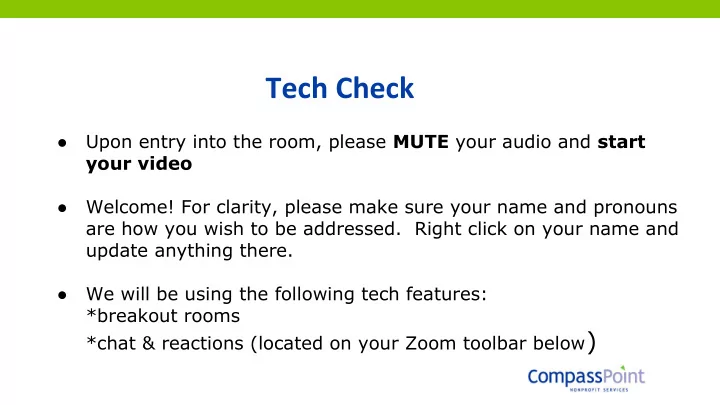

Tech Check Upon entry into the room, please MUTE your audio and start ● your video Welcome! For clarity, please make sure your name and pronouns ● are how you wish to be addressed. Right click on your name and update anything there. We will be using the following tech features: ● *breakout rooms *chat & reactions (located on your Zoom toolbar below )
Coaching Skills: Part Three Steve Lew , Lupe Poblano facilitators Berty Arreguin zoom host
Today’s Agenda and Objectives Agenda • Learn one key coaching skill (Feedback: appreciative and developmental) • Practice, Practice, Practice 3
Community Agreements ✔ Acknowledge you were raised with biases and that you are on a journey to liberate your heart and mind ✔ Offer hope and empathy, but leave advice giving unless guidance/information was explicitly requested ✔ Observe confidentiality (lessons belong to the listener, stories to the story-teller) 4
Feedback What is feedback? “Feedback is information about past behavior delivered in the present which may influence future behavior.” - Charles N. Seashore, Edith Whitfield Seashore, and Gerald M. Weinberg 5
Feedback Real Talk • The complexities of our internalized habits of white supremacy and our internalized inferiority/superiority make giving and receiving feedback challenging • Our offering for today: – Building skills on how we give feedback to one another. 6
Feedback Real Talk • Acknowledgment and Invitation: – Acknowledge: skills are essential and alone are insufficient in dealing with these complexities; – Invitation to further your reflection as homework: to explore/understand how white supremacy culture/habits may be underneath the surface in your relationship to giving/receiving feedback. 7
Two Types of Workplace Feedback Appreciative Developmental Feedback Feedback Purpose: Purpose: To celebrate positive behavior To help improve or develop or accomplishment, encourage performance continuation of valuable action or behavior 8
Feedback in a Few Steps 1. Describe the behavior 2. Impact (positive or negative) 3. Request (stop, start, continue) 4. Coaching 9
Step 1: Describe the Behavior • Observable • Behavioral • Non-judgmental • Specific “Lupe, last month 35% of your client notes were submitted past the due date.” 10
Step 2 : IMPACT • What is the impact? • On you? • On community? • On the organization? • On others? … ..Why does this matter? 11
Step 3 : REQUEST (Appreciative Feedback) • Reinforces behavior • Identify additional opportunities to succeed • Appreciation! 12
Example Instead of : “You were great in that meeting, thanks.” Try: “When you were clear and concise while explaining your idea at the meeting, it really helped the rest of the team to focus and understand the benefits of your proposal more clearly. That will help us make a better decision for the program. I appreciate how well you prepared.” 13
Practice! 14
Round One – Appreciative Feedback • Think of a time when you recently could have given appreciative feedback. • Write down (as in the examples) a draft of what you should (or could have) said instead. • You will be sharing your draft with your fellow participants! 15
Supportive Feedback Rotation • Rotating random pair breakout rooms every two minutes - three different rounds (6 minutes total) • First person reads aloud feedback – no context needed. • Then the next person does the same, then the third (if there’s a third). • Once you’re done, move on to another person and repeat (yes, you’re saying the same thing). 16
Feedback in a Few Steps 1. Describe the behavior 2. Impact (negative) 3. Request (change in behavior) 4. Coaching 17
Example “Lupe, do you have a moment to talk about this morning? When I don’t know that you’re going to be late it doesn’t give us enough time to cover reception. Today we ended up opening late and our clients were waiting outside the clinic. This impacted today’s appointment schedule and a number of other staff were not able to take their lunch break. This caused stress on the staff and for the clients too. I understand that there are times when schedules need to be adjusted; however the expectation is that you tell us ahead of time so we can make other arrangements.” 18
Example “Lupe, I noticed that multiple times during yesterday’s team meeting that you either interrupted or began to talk over the other women of color in the room. Sometimes you would finish their sentences and other times you took the conversation in a new direction when you interrupted them. One of our core team values is amplifying the voices of women of color and redistributing decision-making power: and your interruptions make this challenging. I'm wondering if this observation resonates with you and how you can show up differently at the next meeting?” 19
Round One – Developmental Feedback • Think of a time when you recently could have given developmental feedback. • Write down (as in the examples) a draft of what you should (or could have) said instead. • You will be sharing your draft with your fellow participants! 20
Exercise: Feedback Practice • Speaker : Share a piece of developmental feedback with listener • Listener : give feedback to speaker about the feedback (not about their problem) . – Was the behavior you are being given feedback on clear? – Was the impact clear? 21
Strategies (silent reflection) • What worked? • How will you prepare? • How will you remember? • What support do you need? 22
Wrap up & What's Next? • Resources will be emailed after workshop • July 29th: Review, Integration, and Evaluation • Assignment: journal about how the characteristics of white supremacy culture impact your relationship with giving/receiving feedback. And how might you use the listening, inquiry, and feedback as antidotes to help dismantle white supremacy culture within yourself and your organization? 23
Recommend
More recommend